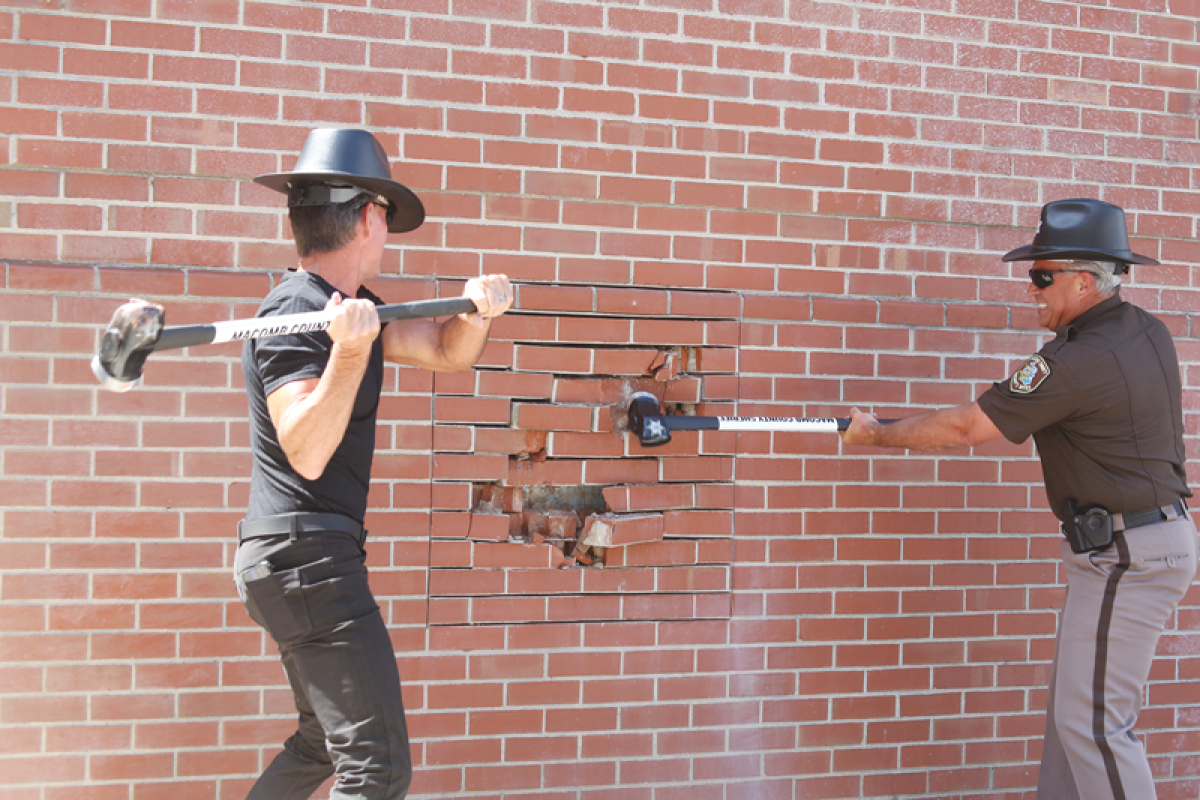
Macomb County Executive Mark Hackel speaks on July 19 during a “wall breaking” ceremony for the central intake and assessment center project.
Photo by Dean Vaglia
MOUNT CLEMENS — For about a year, Macomb County’s top elected officials have dreamed and debated about tearing down old buildings at the Macomb County Jail. On a hot morning July 19 while wearing 10-gallon hardhats, the county’s executive and sheriff finally got their wish.
Macomb County Executive Mark Hackel and Macomb County Sheriff Anthony Wickersham bashed the first hole into the wall of the Macomb County Jail Annex, ceremonially beginning demolition and paving the way for a new jail building to be built. Hackel and Wickersham were joined by Macomb County Board of Commissioners Chair Don Brown and contractors to mark the occasion.
“Demolition is starting today,” Hackel said. “This is the groundbreaking — this is actually going to be a wall breaking.”
Demolition commenced in earnest on July 22, beginning with the annex building. The old maximum security, D Block and rehab buildings are slated for demolition at a later time to make way for the new central intake and assessment center. The goal is to better address inmates with mental health and substance abuse issues.
“Today does begin the next journey that will improve our operations here at the sheriff’s office and the county jail,” Wickersham said. “It will make a better environment for my staff and for the inmates. We will focus on a direct supervision model. We will focus on a very hybrid medical and mental health facility dealing with individuals that have those issues and are remanded here by the bench.”
The central intake and assessment center is planned to be over 159,000 square feet with a capacity for 278 beds, setting the total jail capacity at 1,178 beds. Prior plans called for the building to be 177,000 square feet, housing up to 303 inmates. Design renderings call for a bow tie shaped building that is four levels tall and has an extensive use of windows to let in as much natural light as possible.
“Granger Construction has an extensive resume of correction projects that have been completed over the years, but the central intake and assessment center is truly unique,” said Jeff Havranek, Metro Detroit regional director for Granger Construction. “With an ever-increasing need to address medical, mental health, substance abuse and behavioral disorders that are present in our community, it takes an alternate approach to treatment and therefore an alternate approach to the design and construction of a facility seeking to address those needs.”
Design features will be paired with changes to processing, with correctional deputies screening new inmates for mental health or substance abuse issues upon intake. From there, inmates in need of assistance will be diverted to programs on the top, second and ground floors. Other features planned for the central intake and assessment center include improved video trial capabilities, community corrections facilities, a “full service” court, offices for the county prosecutor and public defenders, and a passageway between the jail and the intake center.
“We know that this county jail is the responsibility of the county to provide a county jail for those that are arrested and detained, and they are now becoming the responsibility of the sheriff,” Hackel said. “We have this responsibility to make sure that we have the right type of facility to manage the people coming in there, but also making a determination as to what are those issues these people may have.”
Plans for the project were announced in May 2023, with the aim of addressing three main improvements for the county jail recognized in a 2016 Macomb County Sheriff’s Office survey: intake and assessment, pretrial services and new medical/mental health environments and services. The $228 million price tag for the project has been consistent since its announcement with funds coming from the county’s general fund, state funding and federal American Rescue Plan Act dollars.
“Macomb County is managed financially conservatively and as a result, our balance sheet is strong and enables us to pay cash for this project,” Brown said in a press release. “The collaborative effort between the Sheriff, County Executive and the Board of Commissioners has led us to this point. When completed, those who come in contact with law enforcement and have drug or mental health issues receive a chance to turn their lives around. This not only benefits them and their families, but the taxpayers and society at large.”
So far, the project is ahead of its initial schedule, which planned for demolition to begin sometime in 2025. Currently in the third phase of the project timeline, construction is expected to be completed sometime by or within 2027.
 Publication select ▼
Publication select ▼



















